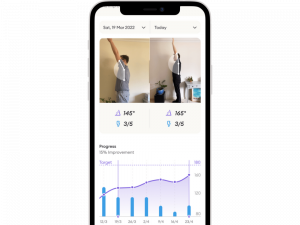Shoulder bursitis is a condition that results in pain and inflammation in the shoulder jointThe glenohumeral joint is a ball-and-socket synovial joint and is the most mobile joint in the human More. This condition is often caused by repetitive motions or injuries. There are many different shoulder bursitis exercises that can help to reduce inflammation and pain in the shoulder joint. These 13 exercises for shoulder bursitis can be performed at home with little to no equipment needed.
The type and intensity of the exercises depends on the underlying cause of the bursitis and the severity of inflammation.
Why do Shoulder Bursitis Exercises?
To begin with, you will want to restore flexibility and range of motion, followed by strengthening exercises targeted at stabilising the rotator cuffThe rotator cuff is a group of muscles and tendons that attach the shoulder blade to the upper arm b More muscles and muscles between the shoulder blades. Always use your symptoms and shoulder stability as a gauge for when you’re ready to progress with repetitions, resistance, and shoulder range.
Stretching & Mobility exercises for Shoulder Bursitis
- Stretching and mobility exercises help to stretch the shoulder muscles and help in reducing the tension.
- The exercises can be performed in standing or sitting position and performed twice or thrice a day.
- Hold the stretches until a comfortable position and do not push to a point of extreme pain or discomfort.
1. Shoulder table slides
- Sit next to a table and place the arm on the table (preferably place a towel underneath the arm to reduce friction).
- Gently slide the arm forward while bending at the waist.
- Hold the position for 3-5 seconds and return to the initial position.
- Repeat 10 times.
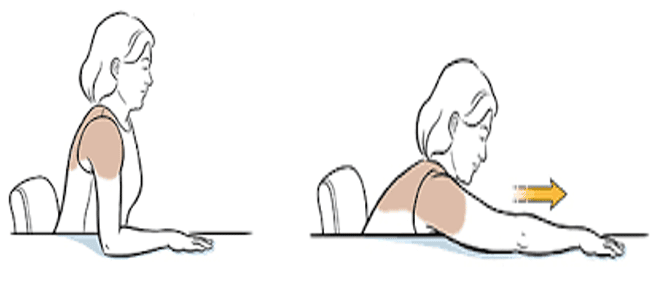
2. Active assisted shoulder flexion with cane
- Stand comfortably in an upright posture and neck relaxed. Grab a dowel, wand, or a walking stick. Hold the stick in your hand at shoulder width down near your thighs.
- Lift up both hands towards the ceiling , as high as possible in a slow and controlled manner. Then, slowly return back to the starting position.
- Repeat 10 times for 2-3 sets.
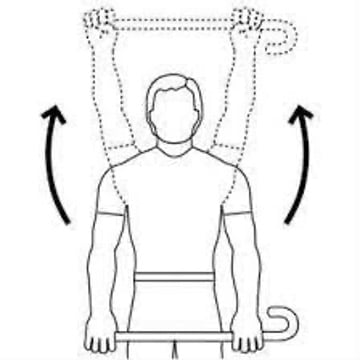
3. Active assisted shoulder rotations with cane
- Stand comfortably in an upright posture and neck relaxed. Grab a dowel, wand, or a walking stick. Hold the stick in your hand at shoulder width down near your thighs.
- Keep your elbows close to your body and move the wand across your body toward the sore arm.
- Hole for 10-15 seconds and repeat for 3 to 5 times.
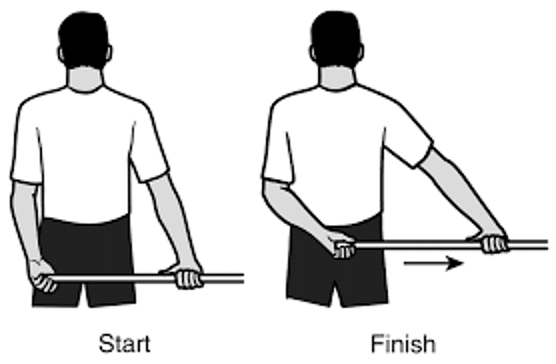
4. Posterior capsule stretch or cross body stretch
- Bring your arm across the body, placing your hand on the opposite shoulder. With the other hand , press over the elbow as if you are pushing the arm backwards.
- Hold this position for 10-15 seconds and then relax.
- Repeat this exercise 3-5 times.
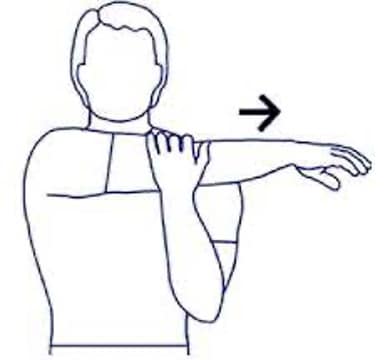
5. Shoulder blade squeeze
- Place your arms by your side. Pull your shoulder back as if the shoulder blades are touching each other.
- Hold the position for 10-15 seconds and then relax.
- Repeat this exercise 5-8 times.
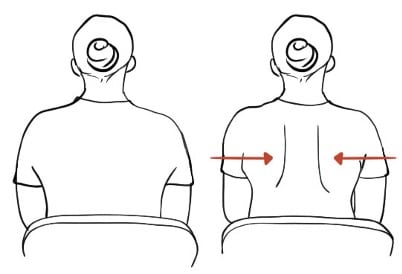
Strength Exercises for Shoulder Bursitis
Strength exercises help to improve the muscle strength around the shoulder joint. This can help to reduce the risk of further injury and provide support to the joint. These strength exercises for shoulder bursitis can be performed at home and require little to no equipment. It is important to perform these exercises with good technique to avoid further injury.
1. Isometric exercises for Shoulder Bursitis
Isometric exercises are a type of exercise that involves contracting your muscles without moving your joints. This type of exercise can help to improve joint stability and muscle strength. These Isometric exercises for the shoulder joint involve holding your arm in certain positions or resistance against an immovable object. These 6 exercises are the main isolated movements of the shoulder function.
Perform these exercises, using wall as the resistance. Apply light pressure.
Hold for 10 seconds and repeat for 5 times.
Flexion
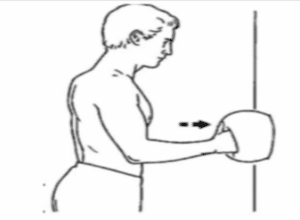
Extension
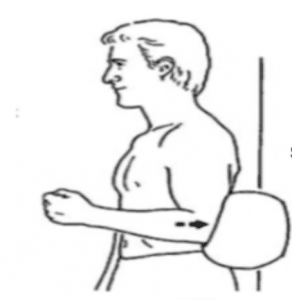
Abduction
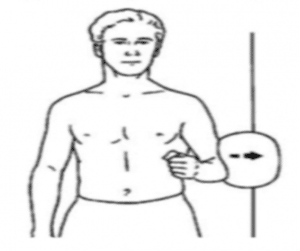
Adduction
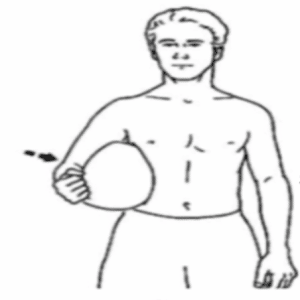
External rotation
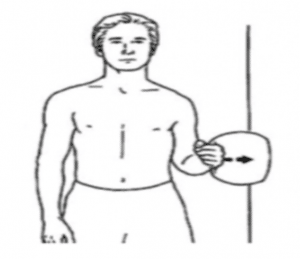
Internal rotation
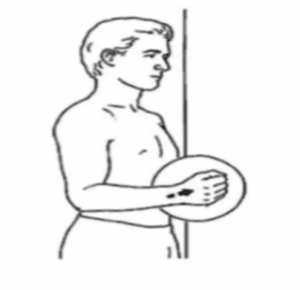
2. Scapular wall push-ups
- Stand facing the wall and place your hands on the wall at shoulder level.
- Slowly bend your elbows and bring your face towards the wall. Keep your back and hips straight.
- Push back to the initial position
- Repeat 10 times
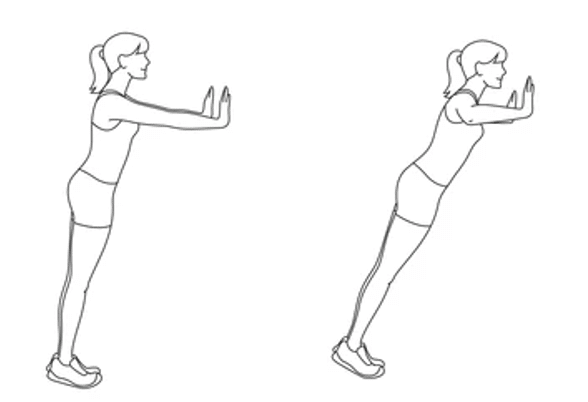
3. Scapular wall angles
- Stand against the wall with feet 6-10 inches from the wall.
- Position yourself so that the entire spine is aligned with the wall and the back of your head is touching the wall.
- Bring your arms up, while keeping them flat against the wall, the shoulders should be abducted, and elbows bend to 90 degrees each.
- Slide up and down the wall while keeping your neck relaxed.
- Repeat 10 times , 3-5 times.
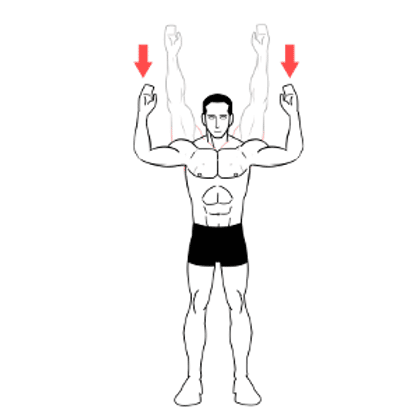
Activities to avoid with Shoulder Bursitis
Activities to avoid depends on the severity of the bursitis, stage of recovery and your fitness level. Keep a watch on the symptoms and decide what activities increase and decreases it.
Some of the movements to avoid during shoulder bursitis include:
- Overhead throwing
- Triceps dip
- Overhead reaching
- Activities which involve heavy lifting
- Avoid unnecessary shoulder impingement movements such as upright rows and arm exercise with thumb pointing downward
- Any other painful movements
Other recommendations
- Always start the exercises with a gentle warm up routine.
- Stretching should be performed prior to strengthening to maximise the tolerance for range of motion.
- Always focus on a good posture with daily activities and while exercising to reduce the impingement.
Check Your Progress
These exercises will help you increase your range of motion and decrease pain. You can use an app like Reflex Health to monitor and track your progress. The app uses AI to accurately measure your shoulder range of motion over your recovery. You can try out the app with a free trial by clicking the link below.
References:
- Frontera, W., DeLisa, J., Gans, B. and Robinson, L., 2019. DeLisa’s Physical Medicine and RehabilitationRehabilitation is the process of helping a person regain strength and function after an injury. This More. Philadelphia: Wolters Kluwer.
- Hanratty, C., McVeigh, J., Kerr, D., Basford, J., Finch, M., Pendleton, A. and Sim, J., 2012. The Effectiveness of Physiotherapy Exercises in Subacromial Impingement Syndrome: A Systematic Review and Meta-Analysis. Seminars in Arthritis and Rheumatism, 42(3), pp.297-316.
- Health, V., 2022. Best Stretches & Exercises for Shoulder Bursitis. [online] Vive Health. Available at: <https://www.vivehealth.com/blogs/resources/shoulder-bursitis-exercises.
- Medicalnewstoday.com. 2022. Bursitis of the shoulder: Symptoms, treatment, and exercises. [online] Available at: <https://www.medicalnewstoday.com/articles/320495.
- Michener, L., Walsworth, M. and Burnet, E., 2004. Effectiveness of rehabilitation for patients with Subacromial impingement syndrome: a systematic review. Journal of Hand Therapy, 17(2), pp.152-164.
- Walther, M., Werner, A., Stahlschmidt, T., Woelfel, R. and Gohlke, F., 2004. The subacromial impingement syndrome of the shoulder treated by conventional physiotherapy, self-training, and a shoulder brace: Results of a prospective, randomized study. Journal of Shoulder and Elbow Surgery, 13(4), pp.417-423.
